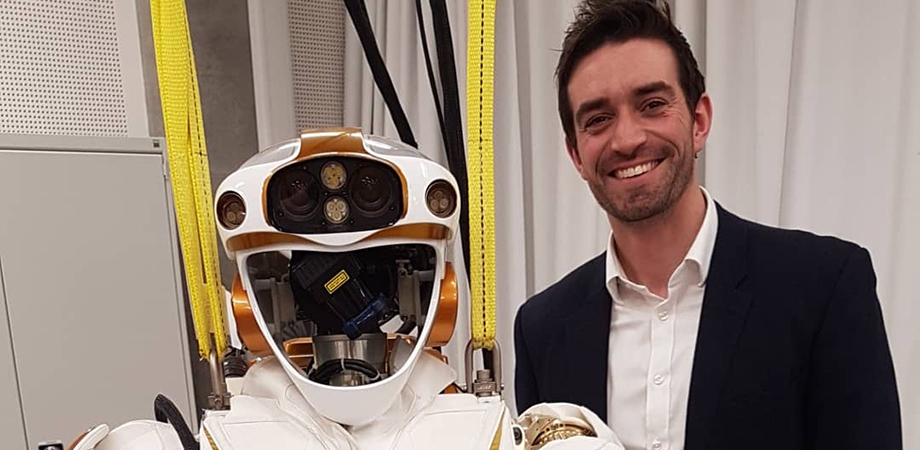Scotland's Booming Space Industry

From the cutting-edge satellites being built in Glasgow to the big satellite data processing happening in Edinburgh, Scotland's growing space ecosystem is impressive for a nation of just over five million people.
Businesses like AAC Clyde Space, Spire, and Alba Orbital in Glasgow are proving that the city can apply ship-building expertise to spaceships, while companies like Ecometrica, Carbomap, and Space Intelligence are helping Edinburgh race towards its goal of becoming Space Data Capital of Europe.
The United Kingdom Space Agency's (UKSA) ambition is to capture 10 percent of the global market by 2030-that's worth £40 billion to the UK. Translate that to the economic opportunity for Scotland, where, according to the Space Sector Report 2017, one-fifth of the workforce resides, and there is the potential to attract £2.5 billion.
Graham Turnock, chief executive of the UKSA, says that Scotland has a strong heritage in the space sector. "In 2018 we announced more than £30 million of funding to support a spaceport in Sutherland, which will build on the country's global reputation for manufacturing small satellites," he says.
"In addition, Scotland will benefit from a £2 million government fund to help horizontal launch sites such as Glasgow and Prestwick airports grow their suborbital flight, satellite launch, and spaceplane ambitions, which could attract companies from all over the world to invest in the region."
This added launch capacity will help Scotland complete its space ecosystem. Edinburgh-headquartered company Skyrora is already testing rockets to low altitudes.
Ukrainian-born Skyrora CEO Vladimir Levykin chose the city for its connections, skilled workforce, and suitability as a place to live. "We've built a range of rockets, and we've launched two of them from Scotland, from a spot near Inverness in the Highlands, close to the proposed launch site in Sutherland," he says.
"We learned a lot from those small launches, around health and safety and all sorts. It was great to get the experience for a larger launch; we're working with all the various stakeholders to understand the challenges."
Funding has also been forthcoming from Edinburgh's City Deal. Its Data Driven Innovation initiative is a £661 million fund to help train 100,000 new data scientists and create 400 data-enabled companies over 15 years. It has provided the financial support to launch the Space and Satellite Innovation Programme at the University of Edinburgh Bayes Centre, which is an innovation hub that brings academics and industry together. The program is led by Murray Collins, Chancellor's Fellow in Data Driven Innovation: Space and Satellite, and CEO of satellite data company Space Intelligence.
This program has already brought Arizona-based Orbital Micro Systems to Edinburgh, where it opened its first international office. It is poised to be the first company to launch a satellite from Scotland's proposed launch site in Sutherland—it has plans for 60 satellites, each the size of a shoe box, that will monitor data to give almost real-time forecasts of weather. Sectors like insurance, agriculture, aviation, and shipping can use these data to save potentially hundreds of thousands of pounds by rerouting aircraft and ships and to more accurately predict crop yields.
As for the move to Edinburgh, chief executive of Orbital Micro Systems William Hosack thinks it's a good fit. "Edinburgh was a great move for us. It's a great quality of life, and the talent is here without the labor costs of Silicon Valley," he says.
On the floor below Orbital Micro Systems in the Bayes Centre is a NASA robot, Valkyrie. Senior researcher and lab manager Vladimir Ivan was instrumental in the year-long negotiations to bring her to Edinburgh.

"We were looking for a two-legged robot with the reach and capability to at least attempt the tasks that humans do, and started the discussion with NASA," he said. "There was a lot of bureaucracy: you're dealing between a university and a US government agency. NASA doesn't usually build things for other people so they had to find a way to get a robot to us," says Ivan.
The groundbreaking move made Edinburgh the only place in the world to work with a NASA robot outside the headquarters. International interest in the lab's findings has been considerable. Oil and gas companies, mining companies, and nuclear power companies have all partnered on research projects to improve the efficiency of their own robots.
"Astronauts complain about being janitors on space stations," Ivan adds. "Our aim is to make the robot stronger, faster, and more accurate—sometimes that means making them more human, sometimes that means making them superhuman."
"We want to create a robot that can go into space and help reduce risk for humans and take them out of dangerous situations. Humans are kind of squishy, they freeze to death easily, and have an annoying reliance on oxygen," he says.
Elsewhere in Bayes, Steve Hancock, lecturer at University of Edinburgh, is working with NASA on another project—the Global Ecosystem Dynamics Investigation program. The GEDI mission launched in December 2018. From its perch aboard the International Space Station, GEDI's powerful lasers create detailed 3D maps of Earth's forests and topography.
"GEDI uses lidar, optimized for measuring forest structures," Hancock explains. "Fuse this with existing data, and the information available about the types and health of forests, for example, is extremely comprehensive."
"Comprehensive" could also be used to describe the Scottish space ecosystem. Though the nation is small, its contribution to space research and industry is significant.
Kim McAllister is a freelance business and broadcaster on BBC Radio Scotland. She also has an eight-part podcast called Edinburgh: Space Data Capital, which is available on Spotify.
| Enjoy this article? Get similar news in your inbox |
|



